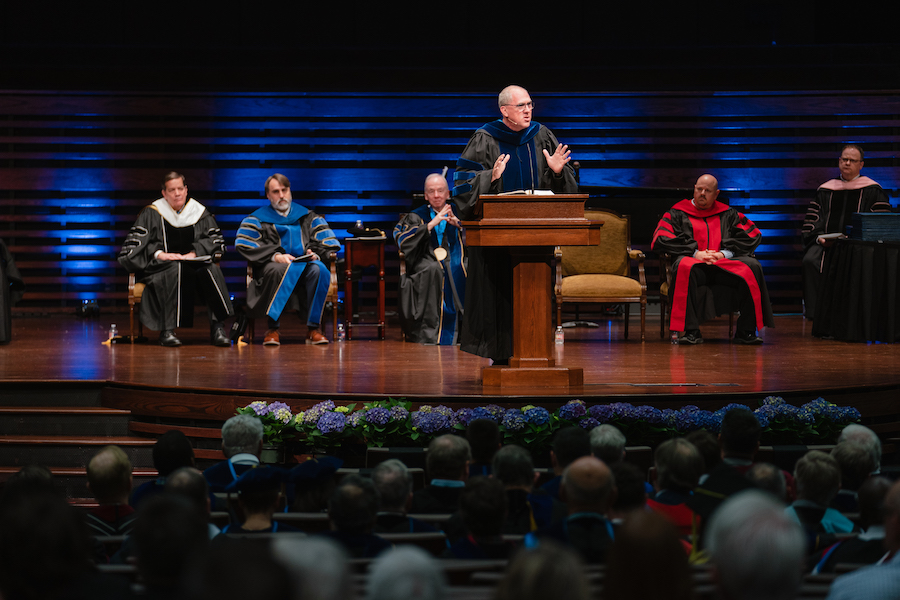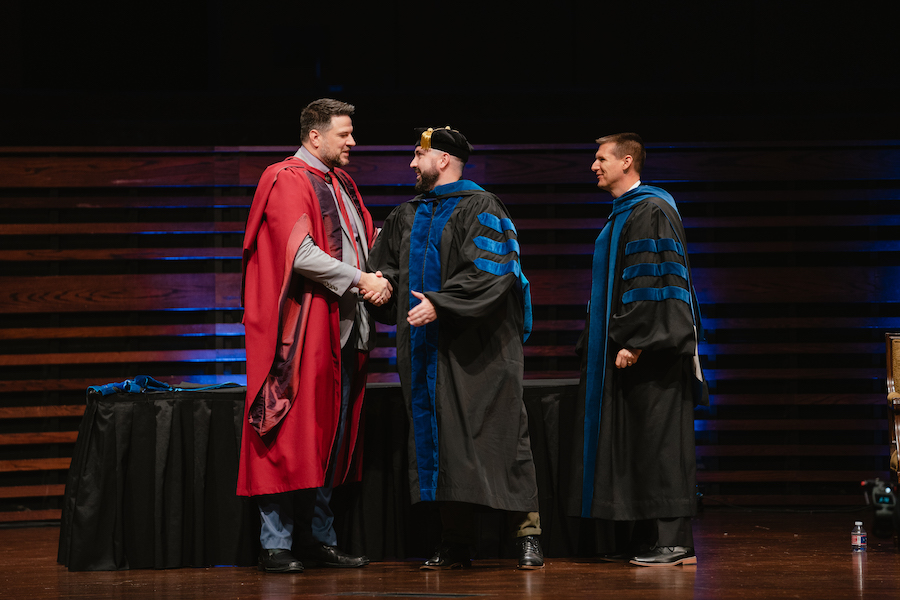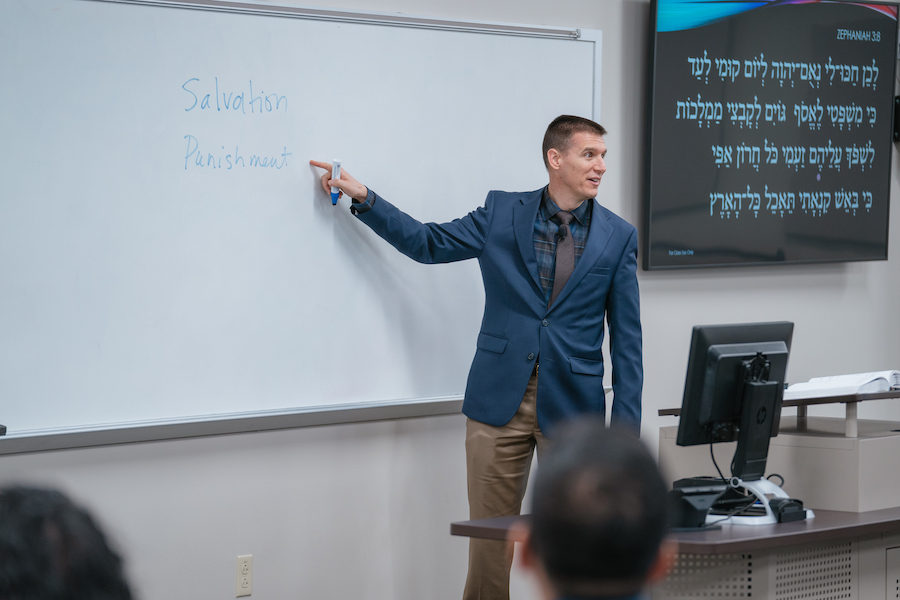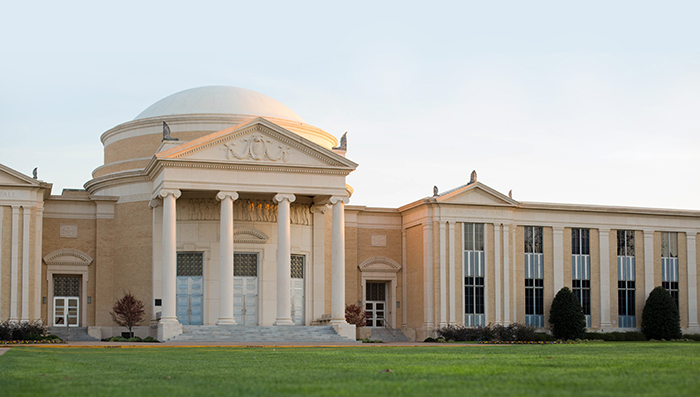‘Well-rounded’ Great Commission ministers of the Gospel
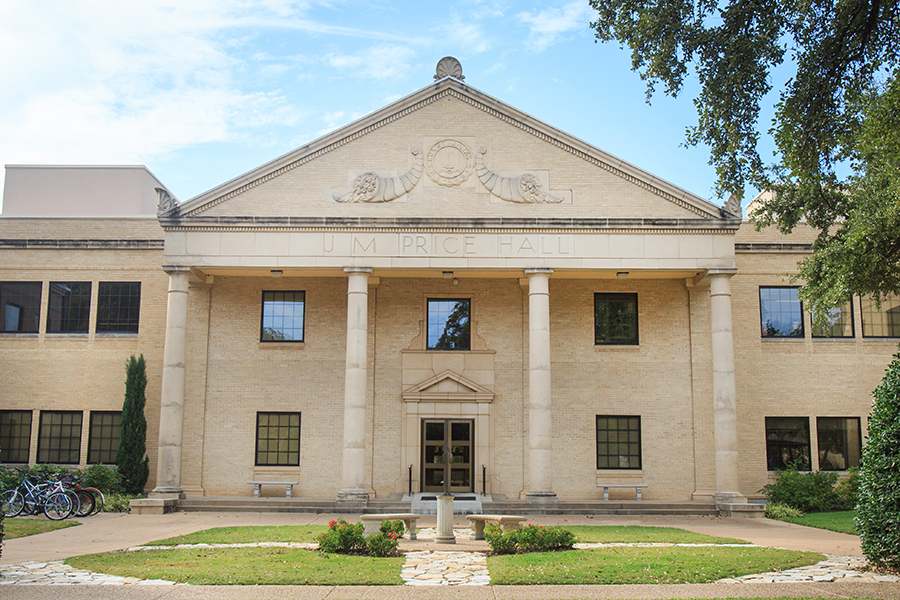
Editor’s Note: This article is part of an ongoing series exploring the schools of Southwestern Baptist Theological Seminary. It originally appeared in the fall 2020 issue of Southwestern News.
Erick Jimenez was nearing completion of his Master of Theological Studies degree at Southwestern Baptist Theological Seminary when he purchased a copy of Jack Terry’s book Christian Education on the Plains of Texas, which chronicles the first 100 years of the seminary’s Terry School of Educational Ministries (1915-2015).
In reading of founder J.M. Price’s vision for the school—the first of its kind in the Southern Baptist Convention—as well as its developing program offerings over the following century to equip teachers, disciplers, and counselors, Jimenez came to value the school’s rich, storied history and was inspired to join that history himself.
So, after completing his MTS in 2017, he enrolled in the Master of Divinity program in educational ministries, which, as of spring 2020, is now housed entirely within the Terry School. Seeing educational ministries as a “big part” of the church today, Jimenez, who serves as minister of discipleship and education at the First Baptist Church of El Paso, Texas, says he is grateful the Terry School’s programs have continued to develop in this direction.
“The educational ministry expansion through the M.Div., that’s one thing that I really have appreciated about the seminary— that they’re adding and changing courses just to be a little more modified in the area of concentrations—like in my case, teaching and discipleship.
“That’s a gifting that I have that I think the Lord has used. And with a more direct degree in those areas, I can definitely feel my confidence getting stronger.”
Like Jimenez, Dean of the Terry School Michael S. Wilder is cognizant of the school’s storied history, saying he feels “an overwhelming sense of stewardship” for the school’s legacy. He notes that “this school has been known, historically, to be the very best in the field.”
Along with his associate dean, Chris Shirley, his many supporting faculty, and in conjunction with the seminary’s administration, Wilder seeks to shoulder this legacy by offering programs that will produce “well-rounded Great Commission ministers of the Gospel.”
Wilder, who became dean in 2019, acknowledges that seminary graduates need to be able to teach and preach with excellence, interact with the Scriptures, and have the right foundations biblically and theologically. “But they also need to be able to lead well,” he says. “They need to be able to develop discipleship processes and approaches in the local church. They need to understand how to train and equip their small-group leaders. They need to know how to multiply and raise up the next generation of pastors in their local church.
“And I am convinced that our redesigned curriculum achieves that well-rounded, fully equipped Gospel minister who will serve with excellence in the local church. No matter what God calls them into, they will be equipped to teach, preach, lead, disciple, and counsel with excellence.”
Great Commission Focus
“Historically, the Terry School has always been known in the Southern Baptist Convention as the standard-bearer for educational ministries—discipleship and disciple-making,” says Chris Shirley, associate dean of the Terry School since 2019.
Alluding to the Great Commission of Matthew 28, he summarizes the school’s purpose in the form of a question, “What is the role of the church in making disciples, and then how do we equip leaders to effectively lead churches in their disciple-making ministry?”
Wilder affirms, “‘Make disciples of all nations’ is the mission of the church. And it seems to me what we do in this field is central to making disciples.”
In order to not only perpetuate this legacy but build upon it, the Terry School recently revised and added degrees to its program offerings. In addition to its ongoing commitment to the “vibrancy of specialized discipleship areas such as children’s and student ministry,” Wilder says, the school has added an emphasis on leadership, strengthened its Christian Formation program, and now offers, among other degrees, a Master of Divinity and Doctor of Education. Finally, the school is continuing to invest in its biblical counseling program.
Leadership
Shirley says the disciple-making function of the church requires leaders who are adequately trained in leading.
“We felt the need for a Great Commission block of classes that reflected overall, comprehensive ministry leadership in terms of strategies for disciple-making and evangelism and missions and worship,” he says. “All of these are necessary skills and understandings in leading the church toward its greatest accomplishment, what it’s mandated to do, and that is to make disciples.”
In light of this vision, each of the Terry School’s programs now includes coursework on leadership.
Shane Parker, who leads this emphasis in the school as associate professor of leadership and educational ministries, says, “Our innovative leadership offerings for both master’s and doctoral students challenge men and women to consider their own Christian formation, along with how they might shape and develop the leaders around them. These classes equip students to understand and lead meaningful change in varied ministry contexts.
“In every class, we invite students to base their leadership upon solid biblical and theological footing, understanding the beauty of shared leadership in the local church.”
Christian Formation
Though a Spiritual Formation course has been part of the seminary’s core curriculum for many years, a re-visioning of the program under Assistant Professor of Christian Formation Coleman Ford will focus on students’ identity in Christ and cultivate spiritual disciplines built upon that foundation.
“The ‘doing’ of Christian life can never be separated from the ‘being’ of Christian life,” explains Ford, who also serves seminary-wide as director of professional doctoral studies. “In our refreshed Christian Formation courses, which lay a comprehensive biblical and theological foundation, the ‘doing’ flows from the ‘being.’”
Now a single two-hour course (as opposed to two one-hour courses in years past), Christian Formation is designed to “impact and inform every other facet of a student’s seminary education,” Ford says.
Master of Divinity
Echoing Wilder’s vision of producing “well-rounded” ministers, Shirley says the Terry School aims to train church leaders, including pastors, to be competent in their understanding of the functioning of church ministry, even outside the pulpit.
“That’s one of the reasons we just instituted an M.Div. that is related specifically to what we do here in the Terry School,” says Shirley, explaining that the school is seeking “pastors who see that their preaching ministry is a part of what they do; it’s important, but they have a lot of responsibilities beyond that in the total functioning of church life.”
Jimenez, who is now halfway through his M.Div. program at the Terry School, says one of the reasons he continued his studies beyond his MTS is because of the school’s “emphasis-focused” M.Div. He explains that the program has already helped him to “appreciate and look for proper curriculum,” as well as taught him how to teach the Bible in different settings such as small groups, one-on-one discipleship, and congregation-wide preaching.
“It’s really helped me formulate a better structure to better teach the people in a more impactful way,” he says.
Doctor of Education
Wilder says the Doctor of Education (Ed.D.), which was approved by the seminary’s board of trustees in their spring 2020 meeting, is designed to equip “scholar-practitioners for leadership and teaching in a variety of settings such as higher education, the church, the mission field, and non-profit organizations.”
“The program design will allow for specialization in organizational leadership, teaching and educational ministries, and higher education administration,” Wilder says. “It is the perfect blend of scholarship and practice, producing women and men who will be influential writers, thought leaders, and problem-solvers.”
Biblical Counseling
Biblical counseling has been “a part of who we are institutionally” since 1996, when John Babler taught the first course in this field at Southwestern Seminary, Wilder says. The program has grown in the years since then, now encompassing master’s and doctoral degrees, as well as certification opportunities for lay people.
Lilly Park, who joined the faculty in the summer of 2020 as associate professor of biblical counseling, explains that Southwestern Seminary’s biblical counseling program “equips students to counsel from a Christ-centered approach based on the authority and sufficiency of Scripture for life problems.” She adds that “every counseling course shows how biblical truths are foundational, practical, and relevant for counseling issues.”
Matthew McCraney, a chaplain recruiter and captain for the United States Army, says he was drawn to the biblical counseling Ph.D. at Southwestern Seminary because of its emphasis on the Bible as the primary source for counseling.
“I was interested in a program dedicated to godly counsel based on Scripture, rather than man-centered approaches,” McCraney says. “The program at Southwestern so far has not disappointed.”
Serving with Excellence
The Terry School’s many current students and alumni testify of the practicality of its degree offerings.
Through his role as a chaplain recruiter, for example, McCraney works with pastors and seminary students, often coaching and mentoring those who are considering a call to ministry in the U.S. Army. He says he has been able to use content from his studies in mentorship groups with such chaplain candidates.
“My studies at Southwestern have sharpened my thought process on complex issues related to ministry and forced me to see issues from multiple perspectives, while relying on Scripture as our ultimate guide for action,” McCraney says. “It is my hope that studies at Southwestern will allow me to better prepare chaplains and pastors for ministry wherever God calls them.”
Josh Rose, a 2007 Master of Arts in Christian Education graduate, serves as group life pastor at Rush Creek Church in the Dallas/ Fort Worth metroplex, leading and nurturing all the adult discipleship ministries across the church’s multiple campuses. He says, “South- western, particularly the Terry School, taught me how to think critically about local church ministry.”
“Local churches today can easily gravitate toward a pragmatically oriented view of ministry,” Rose says. “At Southwestern, I learned how to approach local church ministry not only through a biblical framework of ideas, but what to do with those ideas and how to leverage them toward a framework of educational ministry that produces disciples.”
Current MACE student Grace Kim, who was born in South Korea but grew up in Japan with her missionary parents, says her time at Southwestern has taught her to be a model for her Sunday School students, pray for them, and develop close relationships with them.
“Although it is easier to see the students as a whole, they all have different characteristics, personalities, backgrounds, and talents,” explains Kim, who teaches pre-school through elementary school students at Segero Disciple Church in Fort Worth. “For this reason, I try to spend time with each student so that I can know each one of them and give precise advice according to their needs.”
Nathan Penland, a 2009 MACE graduate now serving as director of student leadership and engagement for Southwest Baptist University in Bolivar, Missouri, says his training in the Terry School prepared him to lead all age groups.
“Knowing I have a solid understanding of different demographics allows me to connect with others in an array of different settings—classroom, conferences, church, social,” he says. “This has afforded me not only valuable ministry opportunities, but also fruitful relationships for the Kingdom.”
Testimonies like these epitomize the Terry School’s historic legacy of equipping well-rounded Great Commission ministers of the Gospel, and Wilder aims to continue offering programs that achieve this end.
“I want students to graduate here with a great affection for Christ and His church,” he says. “I want students to leave here biblically and theologically grounded and practically informed of how to do ministry well. I want them to be biblically faithful and missionally effective. I want our school marked by a robust theological framework with high capacity for practice.
“I want our students to graduate with a love of seeing people come to faith in Christ and then formed in Christ. I want them to make God’s name famous among the nations, and I want them to endeavor to see God’s people formed in His image.”
More testimonies from students and alumni:
- “I have loved my time at Southwestern. It has provided impactful and immediately applicable knowledge to my ministry. I have gained a more complex understanding of the Bible and have committed its teachings in a deeper way into my heart.” – Kennedy Moore, current MABC student; student ministry coordinator and girl’s youth director, Northwest Bible Church, Dallas, Texas
- “The courses that I’ve taken at Southwestern have deepened my knowledge of both the Scriptures and biblical counseling. … I have become a much better counselor because of the program that I’ve participated in at Southwestern.” – Scott Stephens, current Ph.D. student; pastoral counselor, West End Counseling Center, Pendleton Street Baptist Church, Greenville, South Carolina
- “I chose to attend Southwestern Seminary for its diverse faculty and larger student body. This allowed me to complete courses specific to the academic areas I was interested in, and have a robust degree to serve the local church.” – PJ Dunn, MACE ’10; Southwest discipleship consultant, Georgia Baptist Mission Board
